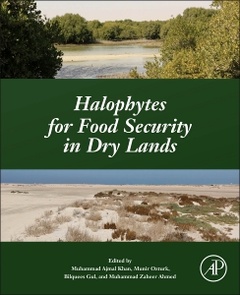Halophytes for Food Security in Dry Lands
Auteurs : Khan Muhammad Ajmal, Ozturk Munir, Gul Bilquees, Ahmed Muhammad Zaheer

Halophytes for Food Security in Dry Lands addresses the concerns surrounding global food scarcity, especially focusing on those living in arid and dry lands
The book touches on food crises in dry regions of the world and proposes halophytes as an alternate source of consumption for such areas. Halophytes, those plants that thrive in saline soil and provide either food source options themselves, or positively enhance an eco-system?s ability to produce food, and are thus an important and increasingly recognized option for addressing the needs of the nearly 1/6 of the world?s population that lives in these arid and semi-arid climates.
Including presentations from the 2014 International Conference on Halophytes for Food Security in Dry Lands, this book features insights from the leading researchers in the subject. It is a valuable resource that includes information on the nutritional value of halophytes, their genetic basis and potential enhancement, adaption of halophytes, and lessons learned thus far.
Characterization and function of sodium exchanger genes in Aeluropus lagopoides under NaCl stress
Multi-temporal soil salinity assessment at very detailed scale for discriminating halophytes distribution
Nutritional value of Chenopodium quinoa seeds grown under saline conditions
Halophytes and saline vegetation of Afghanistan, a potential rich source for people
Overcoming barriers to implementing high salinity agriculture in the Gulf
Carbon mitigation: a salt marsh ecosystem service in times of change
Exploiting plants from extreme environments: world enough, but perhaps not time
The importance of mangrove ecosystems for nature protection and food productivity: Action of UNESCO’s Man and the Biosphere Programme
The Potential Use of Halophytes for the Development of Marginal Dry Areas in Morocco
Transcriptome and proteome analysis of genes involved in salt tolerance in the halophyte Suaeda fruticosa
Sustainable diversity of crops – livestock production system based on optimal utilization in Sinai: A case study
Cell suspension culture of the halophyte Cakile maritima: Establishment and response to salinity
Exogenous chemical treatments to improve salt tolerance of cash crop halophytes
Food and water security for Qatar: a new paradigm
Genetic and environmental management of halophytes for improved livestock production
Drought and salinity differently affect germination of "Chenopodium quinoa Willd"
Plant community and germination of selected halophytes of Sundarbans mangrove forest and diversity
Halophytic Plant Diversity of a Unique Habitat in Turkey – Tuzluca Salt Mine Cave
Halophytes a possible alternative to desalination plants: prospects of recycling saline wastewater during Coal Seam Gas operations
Researchers, professionals and students in agriculture, ecology and ecosystem functioning institutes, botany students and researchers, landscape planning people, hydrology, and geomorphology
- Provides comprehensive coverage of the importance and utilization of halophytes to compensate the demand of food in whole world especially in the dry regions
- Contains insights from ecological to molecular fields
- Includes edible halophytes as well as those that enhance food-producing eco-systems
- Presents information for improving abiotic stress tolerance in plants
Date de parution : 09-2015
Ouvrage de 360 p.
19x23.3 cm
Thèmes de Halophytes for Food Security in Dry Lands :
Mots-clés :
Animal; Antioxidant; Aridity; Atriplex; Biodiversity; Biomass yield; Biosphere reserve; Brackish water; Capacity building; Carbon sequestration; Central Anatolia; Chenopodium quinoa; Climate change; Crop domestication; Desert; Desertification; Diversity; Drought; East Anatolia; Ecological models; Ecology; Electromagnetic induction; Exogenous treatment; Farmer participation; Feeding value; Flora; Fodder; Fodder crops; Food security; GIS; Gene expression; Geostatistics; Germination; Germination eco-physiology; Growth; Halophyte; Halophyte utilization; Halophytes; Halophytes zonation; Ionic stress; Livestock; Local know-how; Man and the Biosphere Programme; Management; Mangrove ecosystem; Medicinal plant; Molecular biology; Morocco; Na+ regulation; Na+/H+ antiporter; NaCl; Next-generation sequencing; Nutritional value; Nutritive value; Oilseed yield; PAM fluorometry; Pakistan; Phytomelioration; Plant composition; Plant selection; Population growth; Productivity; Qatar; Quinoa; Sabkha; Salicornia bigelovii; Saline agriculture; Saline irrigation; Salinity; Salinity stress; Salinity tolerance; Salinization; Salt mines; Salt secretion; Saudi Arabia; Saxaul; Sea rocket; Sediment microbiology; Seed production; Seedling growth; Seeds; Shrubs; Signaling; Soil salinity; Soil salinity gradients; Stale isotopes; Succession; Suspension cells; Sustainability; Traditional uses; Vegetable; Waterlogging; Wildlife; World Atlas of Mangroves; Young human resources



